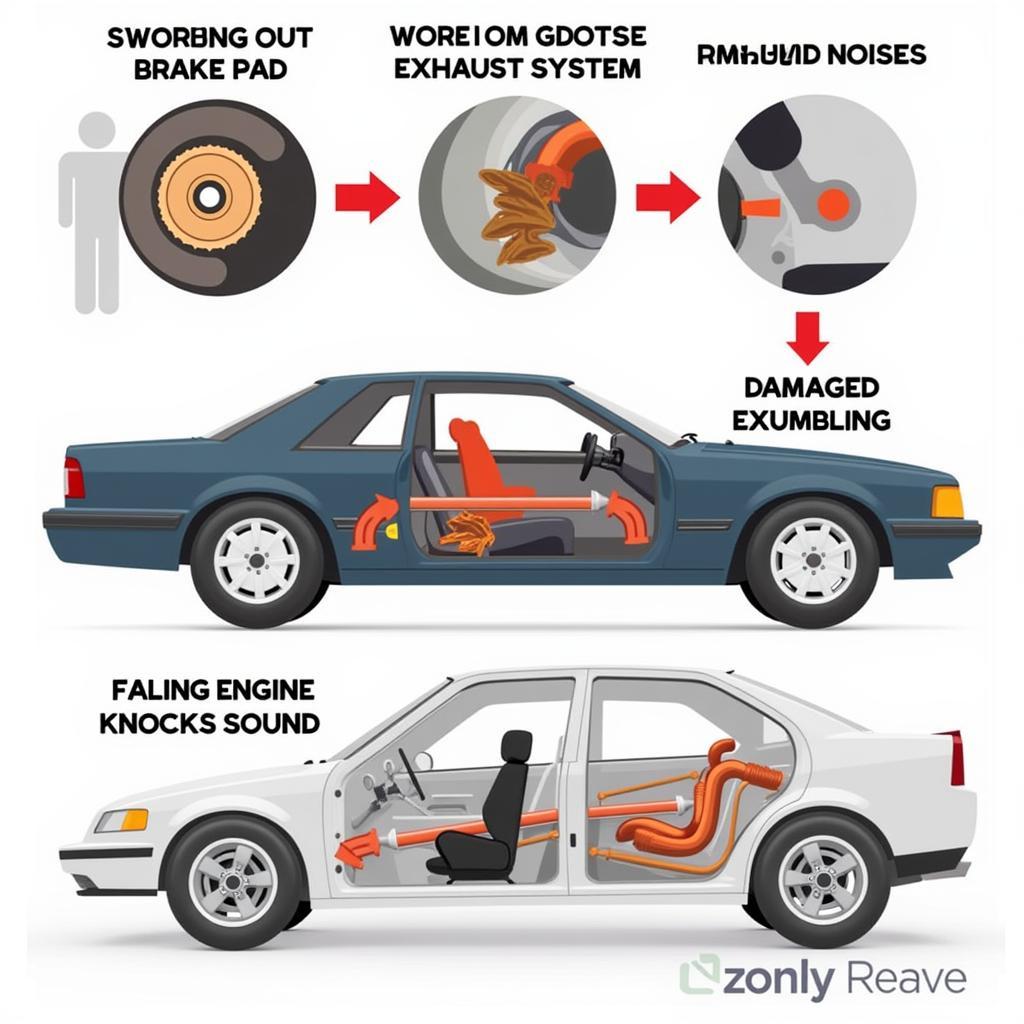Understanding the Symptoms Of Car Problems is crucial for maintaining your vehicle’s health and avoiding costly repairs. Whether it’s a strange noise, a warning light, or a change in performance, recognizing these signs early can save you time, money, and potential headaches down the road. This article will guide you through common car problem symptoms, helping you diagnose potential issues and take appropriate action.
After you’ve driven for a while, you become attuned to the normal sounds and feel of your car. Any deviation from this baseline should trigger further investigation. Don’t ignore those subtle hints your car is giving you; they’re often the first indicators of a bigger problem. Being proactive about maintenance and addressing symptoms of car problems head-on is the key to a long and healthy lifespan for your vehicle. See our troubleshooting car problems video for more visual guidance.
Common Symptoms of Car Problems: What to Look For
Recognizing the symptoms of car problems early is key to preventing further damage. Here’s a breakdown of common indicators:
- Unusual Noises: From squealing brakes to knocking engines, unusual noises are often the first sign of trouble. Pay attention to the type of noise, when it occurs, and its location.
- Warning Lights: Your dashboard is your car’s communication center. Don’t ignore illuminated warning lights, even if the car seems to be running fine. These lights can indicate anything from a loose gas cap to a serious engine problem.
- Performance Changes: A decrease in fuel efficiency, difficulty starting, or sluggish acceleration can all be symptoms of car problems. These changes may be subtle at first, so pay close attention to your car’s overall performance.
- Fluid Leaks: Check your parking spot regularly for any fluid leaks. Different colored fluids indicate different problems, from a leaking radiator (green or orange) to an oil leak (brown or black).
- Vibrations: Unusual vibrations in the steering wheel, pedals, or throughout the car can indicate problems with the tires, brakes, or suspension.
 Unusual Car Noises: Identifying and Diagnosing
Unusual Car Noises: Identifying and Diagnosing
## How to Diagnose Symptoms of Car Problems
Diagnosing car problems can be challenging, but a systematic approach can simplify the process.
- Identify the Symptom: Clearly define the problem you’re experiencing. Is it a noise, a warning light, or a change in performance?
- Gather Information: Research the specific symptom online or consult a repair manual. This will give you a starting point for identifying potential causes. If you’re looking for vehicles suited for specific needs, check out cars good for people with have problems.
- Check the Obvious: Perform a visual inspection of your car. Check fluid levels, look for leaks, and examine the tires. Sometimes the simplest solutions are the most effective. You can even check your car with a smartphone for problems.
- Consult a Professional: If you’re unable to diagnose the problem yourself, it’s best to consult a qualified mechanic. They have the tools and expertise to pinpoint the issue and recommend the necessary repairs.
“A thorough inspection is the cornerstone of accurate diagnosis,” says automotive expert, Michael Stevens. “Don’t rush the process; taking your time can save you money in the long run.”
Symptoms of Car Problems: Engine Related
Engine problems can manifest in various ways, impacting your car’s performance and reliability.
- Overheating: A common engine problem, overheating can be caused by a variety of issues, from a faulty thermostat to a leak in the cooling system.
- Loss of Power: If your car feels sluggish or struggles to accelerate, it could be a sign of a problem with the fuel system, ignition system, or even the engine itself. Electric cars can also experience these problems. Learn more about electric cars problems and solutions.
- Rough Idle: A rough or uneven idle can be caused by problems with the spark plugs, fuel injectors, or other engine components.
“Addressing engine issues promptly is crucial,” advises automotive specialist, Sarah Johnson. “Ignoring these symptoms can lead to more serious and costly damage down the line.”
Symptoms of Car Problems: Electrical System
Electrical problems can be particularly tricky to diagnose, often requiring specialized equipment.
- Dimming Lights: Dim or flickering headlights can indicate a problem with the alternator, battery, or wiring.
- Malfunctioning Accessories: If your power windows, radio, or other accessories aren’t working properly, it could be a sign of a problem with the electrical system. If you’re having specific difficulties, online forums like cars practice problems reddit can provide valuable insights.
- Starting Problems: Difficulty starting the engine can be caused by a dead battery, a faulty starter, or a problem with the ignition system.
Conclusion
Recognizing the symptoms of car problems is the first step towards keeping your vehicle running smoothly. By understanding these signs and taking proactive measures, you can avoid costly repairs and extend the life of your car. Remember, early detection is key. If you’re experiencing any car trouble, don’t hesitate to contact us at AutoTipPro for expert advice and assistance. Our number is +1 (641) 206-8880, and our office is located at 500 N St Mary’s St, San Antonio, TX 78205, United States.




Leave a Reply